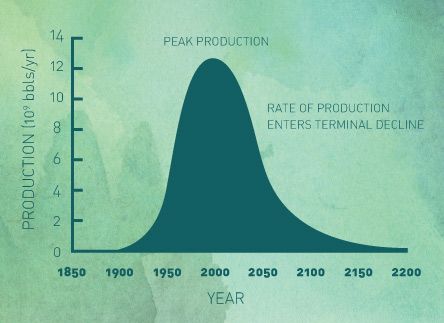Subscribe to our Newsletter
Get regular stories, tips and solutions from Sustainable America and opt-in to receive roundups of the latest food and fuel news.

May 24th, 2012 | By Aubrey Yee
 What is Peak Oil?
What is Peak Oil?
Peak oil is not the end of oil. It’s not as if all the reserves in the world are just going to dry up. Rather, it’s the end of cheap and available oil, something we humans have become quite used to in the last 100 or so years.
EROEI is a term often tossed around in this field of study. It stands for Energy Return on Energy Investment. What this measures is how much energy you create or extract minus the energy you spent during the process. For example, when oil was really cheap and more easily available in 1930, the EROEI was about 100:1. In 2004, when extraction had become much more difficult and costly, it was approximately 11-18:1. That is a significant difference.
When the EROEI is less than 1:1 that energy source becomes what is called an “energy sink” and is no longer feasible from a practical economic perspective. You can’t use more energy to extract the energy that you plan to use, it’s simple math. Peak oil means that the cost to extract oil from the ground will create such low EROEI that oil will no longer make sense as a primary energy source.
This is concerning for many reasons:
It is possible for America to get on a speedy path to sustainability, but it will take a serious and concerted dedication of resources and innovation to achieve real energy and food security. Ready… set… go!
May 24th, 2012 | By Aubrey Yee
I imagine some day hundreds of years from now, when a future humanoid describes the fossil fuel era, they may say something like this:
Humans found the decomposed bodies of long dead organisms big and small buried under the ground. They created a way to burn this sludge and create energy that they used to power all kinds of machines. Unfortunately, the burning of this sludge created all kinds of other problems in the air, water, soil and in the bodies of living beings. Then, the humans realized that there were only so many organisms buried under the ground and they couldn’t keep burning them forever.
http://youtu.be/cJ-J91SwP8w
The term fossil fuels refers to the fuel sources coal, petroleum and natural gas which are all made from the decomposed bodies of once living organisms. It takes millions of years for the bodies of these once living creatures to become the fossil fuels that we use for creating energy today.
We live in a peculiar time. With fossil fuels discovered just a few hundred years ago, we have been depleting a resource that took millions of years to create at a pace that is clearly unsustainable into the future. Yet, until quite recently humankind has not been compelled to change in any significant way. The result is a global economic system that is intimately and perilously dependent on these buried dead organisms.
While there are debates about the reality of Peak Oil, it is clear that we will need to get creative about alternative forms of energy, quickly.
The rising price of oil is unsustainable for America’s economy. In addition, our leaders have acknowledged that our dependency on imported fossil fuels has become a matter of national security. It is clear that alternative renewable energy sources and energy efficiency will be key to creating a sustainable future for America and for the world.
May 16th, 2012 | By Nicole Rogers
This week the US Navy introduced a new version of its MMOWGLI online gaming project. MMOWGLI stands for Massive Multiplayer Online Wargame Leveraging the Internet. The project uses the fictional future scenario shown in the promotional video below to encourage players around the world to join the game, and use their individual expertise to devise solutions to help our military meet its demands while decreasing its dependence on fossil fuels – and anyone can play.
http://youtu.be/wKXrIWsuxnE
The game will be “an examination of what our energy future looks like if we fail to act now,” said Cmdr. James Goudreau, director of the Navy Energy Coordination Office. “Every day that petroleum prices increase, it erodes our ability to train for and execute operations that our nation demands of us. Little by little, that results in decreased combat capability, and that is something we simply cannot accept.”
In essence, the game allows multiple users to interact and collaborate on ideas online, moving through the game by responding to a series of “Call to Action” videos. Talking Points Memo provides a clear explanation of the game here.
In a move that could derail the project, the House Armed Services Committee voted last week to ban the Department of Defense from purchasing alternative fuels that cost more than “traditional” fossil fuels. That would eliminate the purchase of biofuels, at least for the near future. The small biofuel industry cannot compete price-wise with the huge petroleum industry at this point. It was thought that the military’s use of biofuels would help bolster the biofuel industry and drive biofuel prices down.
With programs like the Green Fleet, the Green Strike Force, and their grand goal to get half the energy for Naval shore installations from alternative energy sources, the US Navy is beginning to sound like a group of real-life superheros. Let’s hope they aren’t thwarted at the last moment!

Oct 4th, 2011 | By jeff
Daniel Yergin, author of "The Prize" and "The Quest," discusses the fear of "peak oil" in this article in the Wall Street Journal. This is the fifth time in modern history that there has been widespread fear that the world is running out of oil. But is that really the case?
Continue Reading
Oct 4th, 2011 | By jeff
Stephen F. Hayward reviews Daniel Yergin's new book, "The Quest" for the Wall Street Journal.
Continue Reading
Oct 4th, 2011 | By jeff
In an article by Greg Lindsay, published on September 22, 2001 on FastCompany.com, the author discusses the link between ethanol and financial speculation.
Continue Reading
Mar 25th, 2011 | By jeff
Check out this article on Autoblog.com for an interesting graphic that provides some insight into the fuel efficiency of vehicles powered by:

